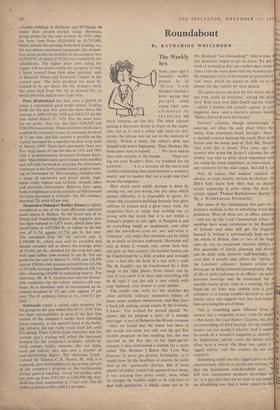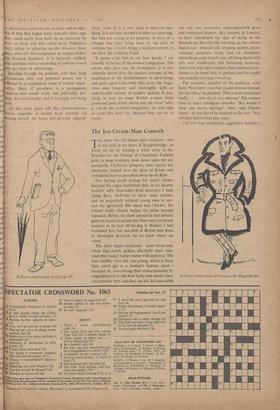Roundabout
By KATHARINE WH1TEHORN
The Weekly Sex
SOME years ago a woman's weekly
printed in its 'Hints from Readers' section a letter saying that people could sweep their own chimneys by throwing old torch batteries on the fire. The letter advised putting a firescreen firmly in front of the explo- sion, but as it used a rather odd word for fire- screen, the phrase was cut out in the interests of clarity. Within a week, the editor's desk was heaped with letters beginning : 'Dear Madam, My three-piece suite is ruined. . . ."We have had to have new curtains in the lounge. . . ."Since try- ing out your Reader's Hint, my husband has no eyebrows. . .' It is a measure of the warm and cordial relationship that exists between a woman's weekly and its readers that not a single one tried to sue the magazine.
How much more subtle damage is done by cutting out, not just words, but any ideas which present difficulty, it is impossible to guess. To create the circulation-building formula that gives millions of women such a glow every week, the magazines have to imply that nothing can fit) wrong with the world that it is not within a woman's powers to put right. A Pangloss is put on everything tough or unpleasant; year after year the sub-editors cross out 'sex' and write in 'romance,' and imply that emotions can be tidied up as easily as kitchen cupboards. Husbands will stay at home if women only comb their hair and give up their careers; the nastiest houses can be transformed by a little crochet and wrought iron; a face like the back of a bus with a conk like de Gaulle's can be transformed by a little rouge in the right places. Even cancer can be cosy if you catch it in time, and everything will be all right if you just talk it over calmly with your husband, your doctor or your mother.
The people who write for the weeklies are often perfectly ordinary journalists (many of them career mothers themselves); and they have a hard job making actual events fit the formula. I know : I've worked for several myself. No sooner did we propose a story of a teenage marriage—a sort of Babes-in-the-Woods romance —than we found that the babes had been :n the woods too soon; not only was the girl five months pregnant on her wedding day, she was married on the first day of her legal-age-of- consent. I once interviewed .a woman for a series called 'The Moment I Knew Our Love Was Forever.' It never got printed, fortunately, or it would have hit the headlines at exactly the same time as her spectacular divorce. But if some , chunks of reality couldn't be squeezed into shape, it was amazing how many could : once, when we thought the reaers ought to be told how to deal with perversion, it finally came out as 'Is My Husband Too Demanding?' After a time, this daintiness began to get us down. We got tired of pretending that our readers were made china from the waist down that we wasted a lot the magazine's time in the mental preparation of 'cod' issue, which we hoped to slide on to tl presses the day before we were sacked.
The game was to see how far this warm, deco ous tone could be stretched : among the plur were 'Knit your own little Dutch cap for winti: —which I believe did actually appear in soil magazine once—and a doctor's column heade 'Make a friend of your abortionist.'
Doctors' columns, though unswervingly r assuring, are often the only place where hai reality does sometimes break through : there a marked contrast between the candy floss of II fiction and the senna pod of 'Tell Me, Doctoi And even this is recent. Five years ago, ti woman who wrote the doctor's columns for ot weekly was told to write about impotence witi out using the word impotence, or intercourse, any synonym for the male organ. And did it, to
Not, of course, that medical columns al always, or even usually, written by doctors.. it BMA little know, how their ban on doctor names appearing in print opens the door fc articles signed 'Thomas Bartholomew Harley' 'By a World-Famous Psychiatrist.'
But some of the sidestepping that goes on I women's weeklies is due to something worse tha prissiness. Most of them are, in effect, censore —and not by the Lord Chamberlain either. A' weeklies have some circulation in the Repubh of Ireland—and what will get the Magazin banned in Ireland is automatically kept out to the whole of Britain. One or two of the large ones do run an occasional separate edition, that questions of family planning and divorc can be dealt with, however half-heartcdly; even then it usually only affects the 'Advice the Lovelorn' columns: feature articles all fiction go on being censored automatically. Soul of this is quite ludicrous in its effects: an actor. previous marriage may be mentioned, but sensible reason given, even as a warning, for Ill break-up; no story may contain even a joyfo reference to a young couple's decision to start family, since this suggests that they had hithert been practising the sin of Onan.
This is something quite different from 0): normal tact a magazine always owes its reader —that keeps the Coal Miners' Gazette, say, fra, recommending oil-fired heating; for the weeklie' readers are not mostly Catholics.' And it mattei, So much of a woman's magazine, is, directly by implication, advice—even the fiction storjo often have a moral. On these two topics it rigged advice, and the readers do not eveo suspect it.
Something rather too like rigged advice is oft0 unconsciously offered on goods and services. NO that any department cold-bloodedly says: lAt will now recommend products advertised wit us'; it is just that they are so used to not treadin on advertising toes that it never occurs to the,
A
to discriminate between one product and another. Yet if they had begun more critically years ago, they could surely have built up an immunity by now, as book and film critics have. Publishers don't refuse to advertise on the Observer book age, after all; film companies no longer eschew he Evening Standard; it is intensely unlikely hat anything with a readership of millions would Ver go short of advertising. Reading through the weeklies, with their huge Circulations, their vast potential power, one is afflicted by a tremendous sense of- wasted oppor- tunity. Here, if anywhere, is a propaganda Medium that would work; not politically, per- haps, but emotionally; and it is simply not being Used All the misty good will that human-interest stories engender is turned back towards the Woman herself, her home and personal relation- Fellow-countryman of George IV.
ships;' none of it is ever used to improve any- -thing. It is not that women's withers are unwrung; but they are wrung to no purpose. A story of a refugee boy may bring tears to the eyes of millions; but it won't bring a hundred pounds to the Save the Children Fund.
It seems a bit late to say how keenly I alb actually in favour of the women's magazines. The advice they give may be inadequate; it is still infinitely better than the random precepts of the neighbours or the blandishments of advertising; and quite apart from what they print, the maga- zines deal honestly and thoroughly with an unbelievable number of readers' queries. If any- thing is ever to wean British women from processed peas, frizzy perms and old wives' tales, it will be the women's magazines; we only sigh at. what they don't do, because they can do FO much.











































 Previous page
Previous page